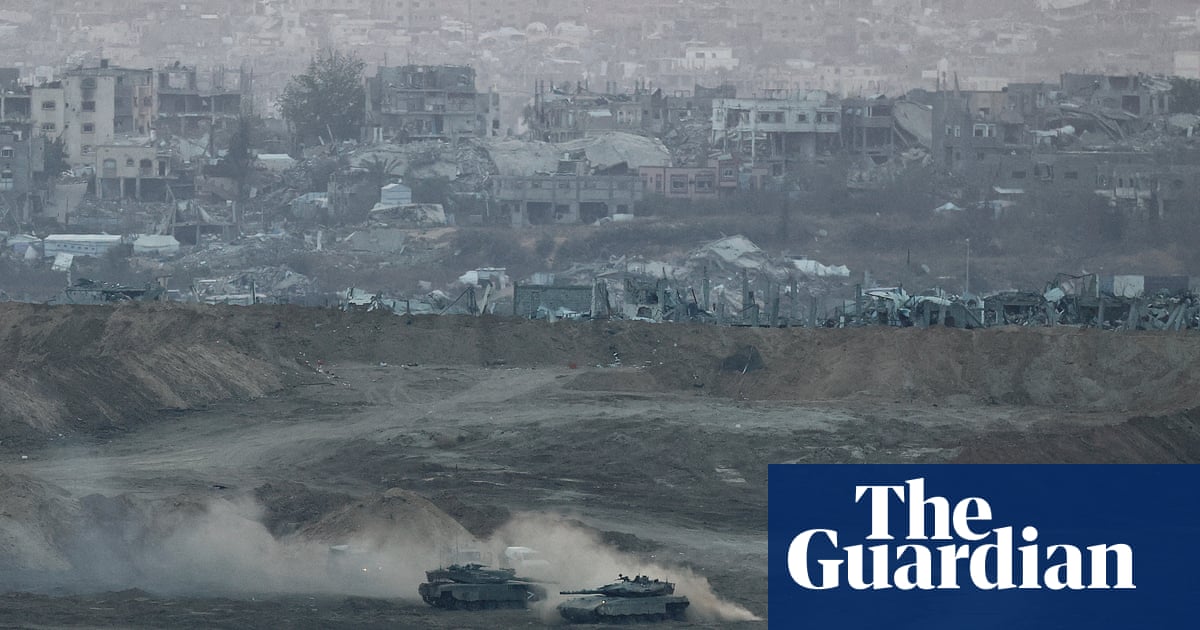The announcement of Israel’s plan to launch imminentlya new, expanded offensive in Gaza and to retain the territory it seizedis a significant moment, at least in terms of public rhetoric.
Throughout the nearly 19-month war, Israeli troops have carried out large and frequently bloody operations that have covered all except central parts of Gaza, but they have largely restricted their permanent presence to a buffer zone about 1km deep along the devastated territory’s perimeter and two relatively narrow east-west corridors.
This now seems to have changed. Once “Operation Gideon’s Chariots” is under way, Israel will send its troops across much – if not all – ofGaza, and will seek to establish a “sustained presence” there, Israel officials said.
Israeli officials are also talking openly about the displacement of Palestinians to southern Gaza, and their potential “voluntary” displacement from the territory altogether to allow the implementation of the reconstruction plan announced by the US president, Donald Trump, in January. The far-right Israeli finance minister,Bezalel Smotrich, told Israelis on Mondayto embrace the word “occupation”.
All this will confirm many people’s long-held fears of Israel’s intentions in Gaza and prompt international outrage.
The idea of a major new offensive in Gaza has been discussed and debated within the government and the upper ranks of the military for some months. So why has Israel’s government announced this plan so loudly? And why now?
A key factor is the indirect talks being held with Hamas about a new ceasefire. The government of the Israeli prime minister, Benjamin Netanyahu, hopes that the Israel Defense Forces’ call-up of tens of thousands of reservists, the threat of the new offensive and the prospect of Israel seizing swaths of territory will force Hamas’s leaders to make concessions.
If it fails to do so, then physical possession of terrain will offer useful leverage in future negotiations and allow Hamas to be squeezed further in the meantime. Israel’s twin war aims – to crush Hamas and free the 59 hostages it still holds – remain unchanged, though Netanyahu has signaled the former is the priority.
Trump is due to visit the Middle East in 10 days, and Israeli officials said the offensive would start after the leader of their country’s most important ally had enjoyed the hospitality of Saudi Arabia, UAE and Qatar. Images of destruction and death from Gaza would make the president’s stay that much more diplomatically delicate. In reality, the complex logistics necessary to move and mobilise additional troops in Israel is likely to mean an even longer delay.
Israel has also now gone public with its plan to allow some aid into Gaza, which has been brought to “the brink of catastrophe”, aid officials say, by two months of Israel’s tight blockade of food, fuel, medicine and everything else.
The scheme involves creating big distribution sites run by private contractors in the south of Gaza, to which vetted representatives of each Palestinian family would travel to pick up food parcels. Israeli troops would guard the bases, likely to be situated in a vast zone up to 5km wide now being cleared along the border with Egypt.
The scheme has been dismissed as unworkable, dangerous and potentially illegal under international law by leading humanitarian organisations. There has been no mention either of who might provide healthcare, sanitation, water, fuel and everything else necessary for life in the territory.
Policy papers outlining and advocating the imposition of a military administration on Gaza have been circulating among senior officials in Israel for more than a year. Netanyahu continues to dismiss out of hand the possibility of the Palestinian Authority, which exercises partial authority in the occupied West Bank, governing the territory. Nor has he outlined any other kind of future political settlement in Gaza. The likely result, should the new offensive go ahead, would be that Israeli troops end up the de facto rulers of much of Gaza and its 2.3 million inhabitants.
The Israeli prime minister also offers little to the majority of Israelis who call for a ceasefire deal to secure the release of the hostages. His coalition still depends heavily on the support of far-right parties who are very happy with the prospect of the new offensive and the prospect of a “sustained” Israeli presence in Gaza. Netanyahu now appears likely to remain in power for the 15 months or so until the next elections.
More than 1,200 people died, mostly civilians, in the Hamas surprise raid into Israel in 2023 that triggered the war, and about 250 were taken prisoner, of whom 58 remain in Gaza. More than 52,000 Palestinians, mostly civilians, have died in the Israeli offensive there which followed.
On Monday – among all the outrage and enthusiasm generated by Operation Gideon’s Chariots – the announcement that Israel’s security cabinet had decided not to establish “at this time”a state commission of inquiryinto the failures that allowed that attack to take place went almost unnoticed.
Any inquiry should wait until the war has ended, Netanyahu told Israelis.
